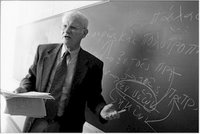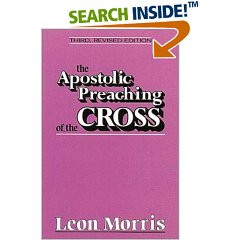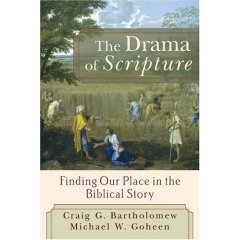
Monday, December 11, 2006
Wednesday, December 06, 2006
Piper, Wright, Pharisees, and Legalism
Piper writes:
"Then, there is Wright’s affirmation of Sanders’ claim that the religion of the Pharisees was not the “religion of legalistic works-righteousness,” and that the “The Jew [of Jesus’ day] keeps the law out of gratitude, as the proper response to grace.” The only explanation I can find for such amazing statements is that the testimony of Jesus is denied or obscured. It is my impression that evangelicals enamored by the NPP have not reckoned seriously enough with the fact that the origination of the NPP seems to have taken place in the halls of such denial or obscuring."
So does Wright believe that Pharisees are not legalists? Again like Piper's Taste and See article from last week in regards to Chris Corcoran, Wright's opinion of the Pharisees is more nuanced that I think Piper anticipates.
Wright states in an interview:
"As a Pharisee (Paul''s perspective), he believed that, once people came into God's covenant by grace, they were to be marked out in the present time, ahead of the final judgment, by their possession of and their attempts to keep the Jewish law, the Torah. As a Christian, he believed that once people came into God's covenant by grace, they were to marked out in the present time, ahead of the final judgment, by their belief that Jesus was Lord and that God had raised him from the dead. To characterize that Pharisaic view as "works-based salvation" is clearly a gross oversimplification and confusion. It is clear to me that (a) most Jews whose views we can track at the time-an important qualification-believed that God called them to be Jews, Israelites, through his covenant actions in the Exodus, etc., fulfilling the promises to Abraham and his seed, i.e. by grace, not by their own works (b) most Jews believed that there would be a final judgment at which their works in the present time would be an important part, if not the whole part, of what counted and that in this respect early Christians like Paul agreed with them; and (c) most Jews believed that you could tell in advance who would be vindicated at that final judgment because they possessed Torah and tried to keep. I say "tried to keep it" because they knew that, if they failed, there were sacrifices to cover such sins. What Second Temple Jews held (to overgeneralize to make a point) was a works-based present justification, and that is what Paul was attacking." [1]
[1] Criswell Theological Review (Spring 2005)
Laurie in Sudan

Moto Zi Ye (Greetings all)!!
Merry Christmas!! I hope you are enjoying the holidays and experiencing God’s goodness. I recently returned from a mission trip to Mvolo, Sudan. Thank you so much for your support, encouragement, and prayers. It was intense – from the living conditions to the isolation and devastation. However, amidst the difficulties was the faithfulness of God’s promises and His almighty power to redeem, renew, and restore. His mercies are new every morning.
God gave us opportunities to repair water wells and tell Bible stories. He opened doors to communicate His Word to the village and county leaders, some of whom are not believers. They even asked us to pray for them. We took a day trip to Kulu, a village that was attacked by another tribe this past May. While there, we gave supplies, shared God’s Word, and prayed for them. My heart broke to see the desolation and loss; however, I saw evidences of hope and life from changed demeanors to the beauty of God’s creation. God has not forgotten them and will restore them.
Our team leader told us that the Jur people would die for us. After living among them, I realized the truth of his words. The Jur people treated us like royalty. They gave us the best of their food and seats of honor. As we walked along the dirt paths, they ran to greet us. They embraced us into their lives, and I’ve embraced them into mine.
This trip was "extreme missions". We lived in mud huts, filtered drinking water, walked through the bush, washed our hair with dirty water, and killed roaches and other insects before entering the latrine. There was no electricity or running water. The weather was over 100 degrees on a daily basis. I’ve never been so consistently filthy, dirty, sweaty, and smelly in my entire life. However, I experienced the sufficiency of God’s grace and His strength to move to the next level of living by faith for the glory of God. I learned much about physical, mental, emotional, and spiritual perseverance while in the midst of desperate dependence on the Holy Spirit.
I can still see the "million dollar smiles" on children’s faces, hear the beating of the drums, and imagine dancing with the Jur people. There’s something life changing about seeing God work in the ends of the earth to bring salvation, redemption, hope, and healing. I’d never been so far removed from everything familiar except God Himself. It’s true: He will never leave us or forsake us. God is good and what He does is good.
For His Glory,
Laurie C. Lau
P.S. You can read more about the mission trip and ministry on www.aidsudan.org.
Monday, December 04, 2006
Ben Witherington's 12 desideratum on NT Theology
(3) If you are an Evangelical, then it is imperative that you interact with non-Evangelical treatments of the text and listen to the church fathers.
(4) As J. Bengel said: apply the whole of yourself to the text.
(5) The text should not be watered down or dumbed down, but one should ratchet up one's attention and degree of devotion to the text.
(7) Western theologians who live in an individualist society should try to understand the collective and honour-shame mindset of the majority world.
(10) Theologizing needs to be done across denominational lines.
(11) Doing NT Theology requires humility not hubris.
(12) The time is ripe for us to redraw boundaries and rethink our differences. "Perhaps all Evangelicals need to spend more time sitting at hte same table, sharing communion, serving one another, serving together in missions, listening to one another, loving one another, and leaving behind triumphalism based on our ecclesiological and theological differences".
Sunday, December 03, 2006
Friday, December 01, 2006
Mercy Ministries
In Randy Nabor's article ," For Goodness Sake, Do Something", he takes the stance that the church, as a corporate body, should and must do mercy ministries. He writes:
I would submit that such negative arguments spring from an undeveloped theology of the church, a defective theology of missions, and the absence of a theology of mercy. We are called to be a new community, to be a body of believers. We are called to help the widows in our midst (1 Tim. 5:3-16); we are given the example of sharing with other congregations who face hard times (I Tim. 6:18); and pastors are instructed to "command" those who are rich in this world to be rich in good deeds. We are given the model in Acts 6 of an ethnic and pragmatic solution to a mercy need within and by the local congregation. We see the community of Israel, as a nation, condemned for a hypocritical practice of religion by not sharing their food with the hungry (Isa. 58). How can we be seen as a "city"(Matt. 5:14-16) if we do not do good works corporately? Congregations are designed by God to be public entities that people see, and unfortunately many of our congregations are "cities" which are seen to do nothing but for themselves
Mr. Nabor believes the church must do mercy ministries because it's essential in evangelizing. He writes:
There are also some who think that we should help only the Christian poor, and those who are within our own congregations. I have always found the argument to only help the poor in the church largely irrelevant if we are obeying the Lord by preaching the gospel to the poor. Was this not his mandate (see Luke 4:18 as mentioned above)? Is it not ours as well? If we are evangelizing among the poor we will have them in the church, and what every poor community in the world needs is a gospel-preaching, holistic, and vital local church in its midst. Poor people need to be saved; they need a whole new set of cultural values built upon the Word of God. They need the practice and experience of the love of the saints and then their families will be rebuilt. And they will have hope, which is the absolute most powerful engine of economic change
On the other hand, William Smith states in his article, "Kyrie Eleison", that Christians should minister to those outside the church, but it shouldn't be one of the essential "marks" of a church. He writes:
Do we as Christians have an obligation to the poor in general? Of course we do. I am willing to help the poor by all sorts of means-kingdom ministries carried on by Christians, responding to the need in front of me with what I have, charitable organizations that are or are not faith-based, and by the paying of taxes. What I am not willing to say is that ministry to the poor of the community is a mark of the church or a necessary component of its health. Indeed, I would argue just the opposite-that the church is weakened and rendered less effective when it puts such ministries at the heart of its life.
Mr. Smith also beliefs that the church should first do mercy ministries to it's own member before those outside of the church. He writes:
First, it is clear that Paul here sticks to the pattern of the rest of the New Testament in putting the primary emphasis on the church's ministry to the church family. If some of this ministry spills over to the world, fine, but good done in the community is not a part of a word-deed strategy for evangelizing the city, nor is it anywhere near the heart of the church's mission.
And because the needs within the church are so great, mercy ministries to outsider shouldn't be the main instrument of evangelizing.
The apostolic practice shows that the church's ministry of mercy is to its members. We have a long way to go before there is not a needy person among us, and we serve one another in humility and love. But, when the church so cares for its own, it demonstrates to the world a "see-how-they-love-one-another" life that testifies to the power of the gospel and may be used of God to provoke the world to jealousy.
What the church needs is a renewed commitment to the mission Jesus gave: "Go therefore and make disciples of all nations, baptizing them in the name of the Father and of the Son and of the Holy Spirit, teaching them to observe all that I have commanded you" (Matt. 28:19). The mission is to make disciples. The means of making disciples are baptizing and teaching. He did not say, Go make disciples by engaging in mercy ministry.
My Thoughts:
First, I think both articles were well written, and give good biblical support for their views. I tend to agree with Mr. Nabor that evangelism, especially to the poor, should be accompanied and initiated through some type of mercy ministry, whether through something "small" like inviting and providing a one time dinner for someone that's poor or "big" like an elaborate after school program for the neighborhood kids. I also agree with Mr. Smith that the church should first minister to it's own members, but I wonder if he would agree that part of ministering to the local congregation entails teaching them to love those outside of the church, thus organizing some kind of mercy ministry, whether "small" or "big", to teach them.
I also think part of the contention involves the use of the language of having mercy ministries as one of the essential marks of a truth church (Preaching, discipline, and sacrament, normally being the other three). Personally, I don't mind saying some kind of mercy ministries is an essential mark of a truth church ( I think acts of love to non-Christians is a mark of a true Christian, and a church is made up of Christians), and I don't think anyone in the argument is trying to devalue the other 3 marks by saying that mercy ministries is essential, especially the need to verbally communicate the gospel in evangelizing.
So in the end, I think I would side more with Mr. Nabor's point of view, but doing so with Mr. Smith's precautions in mind.
[HT Justin Taylor]
Monday, November 27, 2006
Justification and A Tale of Two Imperial Cities

Anthony Lane's writes in an article entitled "A Tale of Two Imperial Cities" about how "[i]n 1541, leading Protestant and Roman Catholic theologians meeting at the Regensburg Colloquy produced an agreed-upon statement on the doctrine (justification). A few years later the Council of Trent defined the doctrine in a deliberately anti-Protestant manner, rejecting the position agreed at Regensburg" [1]
Lane concludes that in Regensburg, both major Protestant and Catholic theologians believed in two types of righteousness, by which Christ's imputed rightousness is the basis for justification.
"At Regensburg, Protestant and Roman Catholic theologians reached a temporary agreement on justification. This was based upon the acceptance of both inherent and imputed righteousness and on the recognition that because of the imperfection of our inherent righteousnes, Christ's righteousness needs to be imputed to us in order for us to be acceptable to God. " [2]
Lane also concludes that the Council of Trent was deeply anti-Protestant, but warns us not to equal modern Catholic belief of justification with the "Tridentine Decree"
"The Tridentine Decree on Justification is a vitally important document, but we must not a fall into the mistake of simply equating it with the Catholic doctrine. Trent is what the Roman Catholic Church chose to say at that time in response to what it then understood the Reformers to be saying. To understand what the Roman Catholic Church today is saying to what it now understands Protestants to teach, we need to listen to contemporary Roman Catholic theology." [2]
[1] Article found in the book "Justification in Perspective:Historical Developments and Contemporay Challenges" edited by Bruce McCormack pg. 119
[2] pg142
Tuesday, November 07, 2006
A Warning in the Imputation Debates

Simon Gathercole writes:
"A statement by Robert Gundry on the (non) imputation of Christ's righeousness in particular has sparked a response by John Piper, and Gundry and Don Carson have also entered the same debate from different stances. It is not not my purpose here to enter this debate. But it should be said that there is clearly a great deal of diversity of opinion on the matter. This is, of course, not sufficient in itself to let discretion take the better part of valor. But in case, the diversity seems to arise out of the complexity of the New Testatment evidence, not because one side is particularly hidebound to tradition and the other wallowing in the desire for novelty or for doctrine that is more amendable to culture. I would not myself deny this traditional understanding of imputation. Still, because of the complexity of the issue, I would propose that the requirement that is is specifically Christ's righteousness that is imputed to believers should not feature on evangelical statement of faith. To make such a finely balanced point an article of faith seems a dangerous strategy. Nonetheless, it is very clear that justification is still christological through and through. Both the cross and the present action of Christ are the vital grounds of justification." [1]
[1] pg 223 of "Justification in Perspective: Historical Development and Contemporary Challenges", edited by Bruce McCormack
Monday, November 06, 2006
Gaffin on Definitive Sanctification

"Further, for Paul sanctification is not only a process involving us in our activity but is also and first of all "definitive sanctification," a decisive, definitive, once-for-all act of God, underlying our activity. A central point of Romans 6-7, for instance, is that while sin is a reality for the believer, it is not my Lord. Because of union with Christ in his death and resurrection I am no longer sin's slave. Sin indwelling but not overpowering; for the believer indwelling sin is not enslaving sin." [1]
"The deepest motive for our sanctification, for holy living and good works, is not our pyschology, not how I"feel" about God and Jesus. Nor is it even our faith. Rather, that profoundest of motives is the resurrection power of Christ, the new creation we are and have already been made a part of in Christ by his Spirit." [2]
[1] "By Faith, Not By Sight: Paul and the Order of Salvation" pg 77-78
[2] pg 78
Sunday, November 05, 2006
Monday, October 30, 2006
The Center of Paul’s Theology and the Order of Salvation

“The central soteriological reality is union with the exalted Christ by Spirit-created faith. That is the nub, the essence, of the way or order of salvation for Paul. The center of Paul’s soteriology, at the center of his theology as whole, then, is neither justification by faith nor sanctification, neither the imputation of Christ’s righteousness nor the renewing work of the Spirit. To draw that conclusion, however, is not to “de-center” justification (or sanctification), as if justification is somehow less important for Paul than the Reformation claims. Justification is supremely important, it is absolutely crucial in Paul’s gospel of salvation” (cf.Eph.1:13). Deny of distort his teaching on justification and that gospel ceases to be gospel; there is no longer saving “good news” for guilty sinners. But no matter how close justification is to the heart of Paul’s gospel, in our salvation, as he sees it, there is an antecedent consideration, a reality, that is deeper, more fundamental, more decisive, more crucial: Christ and our union with him, the crucified and resurrected, the exalted, Christ.
[1] pg. 43 From Richard Gaffin’s “By Faith, Not by Sight: Paul and the Order of Salvation”
Friday, October 27, 2006
This is just sad
Monday, October 16, 2006
Understanding God’s Wrath

In Leon Morris’s book The Apostolic Preaching of the Cross, he gives us some insights on how to think about God’s wrath.
Friday, October 13, 2006
Saturday, October 07, 2006
WJDFW – You Must Be Born Again
“Jesus answered…”Do not marvel that I said to you, “You must be born again”- John 3:5 and 7
[1] pg 37-39
Thursday, October 05, 2006
What Jesus Demands From the World Part 1
I just got my copy of John Piper’s new book, “What Jesus Demands from the World.” In my excitement, I just finished the introductory chapter of the book, where Piper describes his aim for the book in typical Piper-ish fashion:
I can’t wait to dive more into this book and to have my soul satisfied with the presence of God.
Tuesday, October 03, 2006
The Drama of Scripture

“The Drama of Scripture: Finding Our Place in the Biblical Story” by Craig Bartholomew and Michael Goheen is probably the best book I have read all year. In Bartholomew and Goheen’s book, it sets out to help Christians find their purpose within the larger biblical story by organizing the story into a six-act structure:
Act 1: God Establishes His Kingdom: Creation
Act 2: Rebellion in the Kingdom: Fall
Act 3: The King Chooses
Scene 1 A People for the King
Scene 2 A Land for His People
Interlude: A Kingdom Story Waiting for Ending: The Intertestamental Period
Act 4: The Coming of the King: Redemption Accomplished
Act 5: Spreading the News of the King: The
Scene 1 From
Scene 2 And into All the World
Act 6: The Return of the King: Redemption Completed [1]
Not only is this book helpful through it’s six-act structure, in my opinion, it also seems to be making the right emphasis within the larger biblical story. The authors states their 3 emphases as:
1. Comprehensive scope of God’s redemptive work in creation.
“First, we stress the comprehensive scope of God’s redemptive work in creation. The biblical story does not move toward the destruction of the world and our own “rescue” to heaven. Instead, it culminates in the restoration of the entire creation to its original goodness.” [2]
2. The believer’s own place within the biblical story.
“Second, we emphasize the believer’s own place within the biblical story. Some refer to four questions as foundational to a biblical worldview: “Who am I?” “Where am I?” “What’s wrong?” “What’s the solution?” Tom Wright adds an important fifth question: “What time is it?”…As part of our telling of the Bible’s grand story, we will explore the biblical answers to these five questions. [2]
3. Centrality of
“Third, we highlight the centrality of mission within the biblical story. The Bible narrates God’s mission to restore the creation.
[1] pg. 27
[2] pg.12-13
Sunday, September 24, 2006
The Uneasy Conscience
Henry illustrates the need for evangelical to engage with the culture with the following story:
“In a company of more than one hundred representative, evangelical pastors, the writer proposed the following questions: “How many of you,during the past six months, have preached a sermon devoted in large part to a condemnation of such social evils as aggressive warfare,racial hatred and intolerance, the liquor traffic, exploitation of labor or management, erance, or the like-a sermon containing not merely an incidental or illustrative reference, but directed mainly against such evils and proposing the framework in which you think solution is possible?” Not a single hand was raised in response.” [1]
But not only does Henry want evangelical to be active in the societal problems, but he wishes for those action to be grounded in deep biblical reflections. Richard Mouw writes in the foreword:
“Carl Henry’s call to action in the 1940s was not a mere summons to activism. It was an invitation to an evangelical cultural involvement that was based solidly on the kind of profound theological reflection that could only be sustained by a social program that was closely linked to a systematic commitment to the nurturing of the life of the mind. And while the evangelical academy has known much scholarly success in recent decades, there is often a considerable disconnect between grassroots evangelical activism and carefully reasoned theological orthodoxy.” [2]
Finally Henry reminds Christians that only the redemptive power in the gospel can save our society. He writes:
“The evangelical task primarily is the preaching of the Gospel, in the interest of individual regeneration by the supernatural grace of God,in such a way that divine redemption can be recognized as the best solution of our problems, individual and social”. [3]
I highly recommend this book, as a reminder to Christians that we have the only solution to redeem the world. May God give our churches and individuals the wisdom and creativity to use the gospel to solve the problems of the world.
[1] pg. 4
[2] pg. xiii
[3] pg. 89
Sunday, September 17, 2006
Saturday, September 16, 2006
Skinny Models Banned from Catwalk
"Madrid's fashion week has turned away underweight models after protests that girls and young women were trying to copy their rail-thin looks and developing eating disorders.
Organizers say they want to project an image of beauty and health, rather than a waif-like, or heroin chic look." [1]
[1] From CNN
Thursday, September 14, 2006
Piper's New Book: "What Jesus Demands from the World"

The four Gospels are filled with demands straight from the mouth of Jesus Christ. These demands are Jesus’ way of showing us who he is and what he expects of us. They are not the harsh demands of a taskmaster. For example, the demand that we come to Jesus is like the demand of a father to his child in a burning window, “Jump to me!” Or like the demand of a rich, strong, tender, handsome husband to an unfaithful wife, “Come home!” What Jesus demands from the world can be summed up as: “Trust and treasure me above all.” This is good news!
In What Jesus Demands from the World, John Piper has gathered many of Jesus’ demands from the four Gospels. He begins with an introduction that puts the demands in a redemptive-historical context, then concisely examines each demand. The result is an accessible introduction for thoughtful inquirers and new believers, as well as meditative meat for veteran believers who want to know Jesus better.
“The Christian gospel is more than just a wonderful offer of saving grace; it is a demand for supreme loyalty, for surrender to the lordship of Jesus. We forget this too easily in our contemporary church, besieged as we are by a philosophy of pluralism that rejects ultimate authority and a culture of rights that scorns submissiveness. But John Piper reminds us of the real truth: obedience to Christ’s commands is our absolute duty; yet, paradoxically, in his service is perfect freedom and joy!”William J. U. Philip, Minister, St George’s-Tron Church, Glasgow, Scotland, UK
“John Piper reveals in his ‘Word to Biblical Scholars’ his familiarity with the literature and subject matter of the life and teachings of Jesus, and in his comments on the individual demands of Jesus he applies them to everyday living.”Robert H. Stein, Senior Professor of New Testament Interpretation, Southern Baptist Theological Seminary
“This is now my favorite book by John Piper. In the best tradition of Adolf Schlatter’s Do We Know Jesus? and his ‘hermeneutic of perception,’ What Jesus Demands from the World has changed my life and will certainly change yours because it is based on the pure words of Jesus as revealed in the four Gospels. A must-read for every true follower of Christ.”Andreas J. Köstenberger, Editor, Journal of the Evangelical Theological Society; Professor of New Testament and Director of Ph.D. Studies, Southeastern Baptist Theological Seminary
“This book is a special gift from the pen of John Piper. How long has it been since you carefully reflected upon the authoritative commands of Christ? Through these pages you will encounter the Savior and experience the transforming effects of the gospel. Few endeavors are more worthy of your time.”C. J. Mahaney, Sovereign Grace Ministries
“Scholars, popularists, and now even novelists are falling over each other today in a blind passion to discover an alternative Jesus to the One so magnificently portrayed in the biblical Gospels. In stark and refreshing contrast John Piper clear-sightedly grasps the obvious—the biblical Jesus is worth living for and dying for.”Sinclair Ferguson, Senior Minister, The First Presbyterian Church, Columbia, South Carolina
“This is a peculiar book. It assumes that the four Gospels are true and unified. It assumes that Jesus not only does things for us but also makes demands of us. And it assumes that Jesus has authority over everyone regardless of their religion, gender, race, income, sexuality, nationality, or culture. You will likely not agree with every point. But you will hear from a Jesus who is more than a soft-spoken, effeminate, marginalized, Galilean hippie-peasant in a dress and has the peculiar notion that he alone is Lord.”Mark Driscoll, Pastor, Mars Hill Church, Seattle
Wednesday, September 13, 2006
Prosperity Theology

This week's issue of Time magazine has an article on the "prosperity theology" - a message that God promises Christian's material wealth if they are faithful to him, entitled "Does God Want You to Be Rich?".
Al Mohler has a good quote on why "prosperity theology" is so popular in America. He writes:
"Prosperity theology is fueled by the combination of Pentecostal teaching and American consumerism. Our culture of material abundance (and consumerist appetites) is fertile ground for the emergence of this distorted and corrupted teaching. Jesus never promised His disciples material security, much less material prosperity. The benefits of the Gospel of Christ are redefined in terms of material and financial blessings."
Justin Taylor has an interesting proposition on how to react against this "prosperity theology":
"What can we do about this? Very few, if any of us, will be able to have personal contact with someone like T.D. Jakes or Joel Osteen. And most boycotts don't work. But why not write a letter or try to meet with the manager of your local Christian bookstore if they sell books like this, seeking to persuade them that selling books like this is a disservice to the body of Christ? It would be a good way to practice being an ambassador of Christ, it would seek to serve the church, and it's something that might actually make a difference."
Tuesday, September 12, 2006
John Frame's Warning Against Laziness
When I first got into Reformed theology, I thought that everything the popular and modern Calvinist did was "right", especially in relationship to church activities such as expository preaching, hymns, and worship service style, and if a church did not function like a "reformed" church, they were in "sin". Today, I still value and love the old hymns, and I still believe the best way to preach is expository, but I just don't know if the "Reformed" way is the only "right" way to do things at church. So what has caused me to change my view? Probably the greatest influence in changing my view has been a book by John Frame entitled, "The Doctrine of the Knowledge of God", this book simply humbled me, as I thought I knew what was the "right" way to handle and apply scripture to church and life.
Here's are a few quotes from John Frame's article "The Burden of Change: A Warning Against Laziness and Shortcuts" which will give you a flavor of John Frame's view of how Christians should think about Scripture and tradition in relationship to our present time.
1. Applying Scripture in the Present
Historical change is an important part of our ethical situation. As we apply the law of God, we must understand how it applies to each situation that comes before us. That work never ends. We may not assume that the Reformers or the Puritans, for example, finished the task, no matter how great our respect for these great ministers of the Word. The Puritans did not have to evaluate nuclear warfare, genetic engineering, modern science, or the “new age” from Scripture; but we cannot avoid those tasks in our own time.
2. The Danger of Unhealthy Traditionalism
For example, it is not scriptural to approach ethics with a mere traditionalism, a desire merely to emulate the Christianity of a past age. Whether or not we believe that past ages were “better” than this one, our mandate is not to repristinate or recreate a past situation; it is to apply the scriptures to the situation of today. I fear that some churches seek to be mere museum pieces: historical artifacts where people can go to hear old-fashioned talk and experience older forms of church life; spiritual versions of Colonial Williamsburg. On the contrary, Christian worship is to be contemporary, because it must be intelligible (1 Cor. 14), and the church’s preaching must adapt (insofar as Scripture permits) to the language and habits of the target population (1 Cor. 9).
3. Unnecessary Labels
The debate is confused, of course, by words like “conservative,” which are applied both to defenders of scriptural principle and to those who merely defend past ways of doing things without scriptural justification. But defending authentic Biblical principle is one thing; defending the continuance of past applications into our own time is something very different. Both shortcutters and critics of shortcutters need to be more aware of this distinction.
4. Danger of Selfishness
But what masquerades as a battle for Biblical principle is often at bottom a mere rationalization of selfish impulses, a desire to stay comfortable, to avoid having to change familiar patterns. Often, however, Scripture itself is on the side of change! 1 Corinthians 9 is an important text in this respect. Paul was willing to be a Jew among the Jews, a Gentile among the Gentiles, that some might be saved. He did not seek his own comfort, even his own rights. Indeed, he allowed his body to be buffeted, lest while preaching to others he himself should be a castaway. He tried "to please everybody in every way. For I am not seeking my own good, but the good of many, that they might be saved" (1 Cor. 10:33). And note: Immediately after this verse, he urges, “Follow my example, as I follow the example of Christ” (11:1).
This means that in our evangelistic methodology, indeed in our worship (for that too has an evangelistic element, 14:24f), our goal must not be to please ourselves, but to bend and stretch, to accept discomfort and the trauma of change, in order to speak the Christian Faith into the contemporary world
Friday, September 08, 2006
Wednesday, September 06, 2006
Friday, September 01, 2006
USA Basketball and Desiring God
Friday, August 25, 2006
Mark Seifrid: Tolerance in Justification
In Mark Seifrid’s [1] article, “Luther, Melanchton and Paul on the Question of Imputation” [2], he wishes for more tolerance in the divergent opinions in relationship to justification, in particular those who would like to broaden it to include the transformative aspect of God’s divine grace. He argues for this by discussing Luther and Melanchton historical dispute in regards to justification.
Seifrid describes Melanchton view of justification in the period between 1530 and 1534 as somewhat confusing by which he is able to describe justification as a “being made righteous” (transformative) as well as a “being pronounced righteous” (declarative), but later his view appears to change to a “purely forensic terms over against his earlier writings” [3]
[1] New Testament Professor at Southern Seminary
[2] Article found in the book, “What’s at Stake in the Current Debates Justification” pg. 137-152
[3] pg. 142
[4] pg. 141
[5] pg. 145
[6] pg. 143
[7] pg. 150
Wednesday, August 23, 2006
FPC and The Pearland Overture
"Mr. Moderator,
My name is Y.T. Wei.
I am an Elder member of this presbytery. I come from Formosan Presbyterian Church. Our Session concurred with the overture from Pearland Presbyterian Church.
So I am speaking in favor of it. We want New Covenant to declare its intention as a presbytery to maintain the ordination requirements of the Book of Order as essentials of our polity.
Most Presbyterian leaders in the Taiwanese community, like our Session at Formosan PC here in Houston, do not understand why the PCUSA seems to be constantly arguing over the possibility of ordaining people who do not see any need to repent of disobeying the 7th commandment.
We believe the Bible clearly teaches that homosexual practice and all other forms of adultery are wrong. It is important for our Christian witness in the Taiwanese community that we belong to a church that takes fidelity in marriage and chastity in singleness to be basic and essential standards of Christian morality.
We would prefer not to have to enter into this debate. But the PUP report recommendation #5 which passed at General Assembly makes it necessary for us to speak up. Without giving us a chance to vote on it at the presbytery level, this PUP report seems to have opened up the possibility that the ordination standards we have always counted on as the Biblical witness of the PCUSA are no longer firmly reliable.
Please don't put us in such an awkward position within our community. We believe this overture will help Taiwanese Presbyterian Churches to maintain a faithful Biblical witness and therefore to remain in the PCUSA.
Please vote "Yes" for this overture.
Thank you and God bless you."
Monday, August 21, 2006
Within The Bounds of Orthodoxy
" The selective reading has been particularly devastating. It is so easy these days to accuse another person of heresy and to have this charge spread nationwide. But should we not take the charge of gospel slander with much more gravity? Should not love believe and hope all things concerning a brother in Christ? Indeed, it seems to me that we should never accuse of heresy unless we have sweated blood in a ferocious attempt to prove that our brothers were not heretics. Until we have spent all our effort trying to read them as charitably as possible, we have no right to speak against them."
Friday, August 11, 2006
John Frame on "Leaving the Church/Denomination"
For those in PCUSA, you might want to check this out.
Wednesday, August 09, 2006
FAKE Interview with John Piper and N.T. Wright Part 2
Interviewer to Piper: To my understanding, you do not believe that Romans 2 is a "hypothetical" statement, so what does works have to do with the last judgment?
Piper: "In the last day there will be a judgment. It will settle finally and publicly who enters eternal life and who doesn't. The verdict, "not guilty," at this judgment will be based on the work of Christ on the cross. The guilt of all true believers was carried by Jesus: "the Lord has laid on him the iniquity of us all" (Isaiah 53:6). But that verdict will "accord with our deeds" - our daily lives will give evidence that we trusted Christ more than money and that we loved him more than the praise of men. [1]
Interviewer to Wright: If works are the necessary evidences for Christian in the final judgment, where can we find our assurance for salvation?
Wright: As God's true people, they are therefore assured of eternal life. Chapters 5-8 are one long argument for assurance, based on the new covenant blessings of forgiveness and the Spirit. The same Spirit who inspired justifying faith is at work in believers to do 'what the law could not do' (8:3)—to complete, in other words, the renewal of the covenant. He will give life in place of death (8: 1-11), holiness in place of sin (8: 12-13), sonship in place of slavery (8:14-17), the new creation in place of the old, and therefore hope in the midst of sufferings (8:18-27).Chapter 8 thus rounds off the train of thought that began in 2:1-16, and proves that the present verdict of 'righteous' will indeed be reaffirmed on the last day. Christians are those who 'by patience in well-doing seek for glory and honour and immortality' (they seek for it, even now they do not earn it, those to whom God 'will give eternal life'. [3]
Interviewer to both: If someone is struggling with their salvation, what would you say to them?
Wright: [It would depend on the situation, but one of the things I would say is that], "the doctrine of justification by faith is that all this is even now certain for those who believe in the Gospel; the experience of justification by faith is the steadfast looking away from oneself at the objective facts of incarnation and atonement, revealing as they do the unchanging and unshakeable love of God for his people. This is justification: because of the work of the Son and the Spirit, God pronounces in the present the future verdict of 'righteous' over all who believe. Irrespective of moral or racial background, believers are declared to belong for all eternity to the true people of Abraham, the family of the renewed covenant, the people whose sins are forgiven. [3]
Piper: [Firstly], we should look to Christ and the glory of his finished work on the cross for sinners… Justification and eternal life are not earned by our deeds. They are freely given to those who look to Christ in faith. So if we are going to obtain the glory of God and be glorified we must trust Christ. [5]. Secondly, we should continually pray for God to "enlighten the eyes of our hearts" (Ephesians
Interviewer to Wright: Why are you against the idea of imputation of Christ's righteousness?
Wright: "There are only two passages which can be invoked in favour of the imputed righteousness being that of God or Christ. The first proves too much, and the second not enough. The first is 1 Corinthians 1.30f., where Paul says that Christ has become for us wisdom from God, and righteousness, sanctification and redemption. Wisdom is the main point he is making, and the other three nouns come in as a way of saying ‘and everything else as well’. ‘Yea, all I need, in thee to find, O Lamb of God, I come’; that line sums it up well. I doubt if this will sustain the normal ‘imputation’ theology, because it would seem to demand equal air time for the imputation of wisdom, sanctification and redemption as well. The second passage is 2 Corinthians 5.21, which as I have argued elsewhere is not, as a matter of good exegesis, a statement of soteriology but of apostolic vocation. The entire passage is about the way in which Paul’s new covenant ministry, through the death and resurrection of Jesus, is in fact God’s appointed means for establishing and maintaining the church. ‘So that we might become God’s righteousness in him’ means that in Christ those who are called to be apostolic preachers actually embody God’s own covenant faithfulness. I do not expect to convince you by this microcomsic summary of the point, but I submit that it deserves careful exegetical consideration, not dismissing with a wave of the hand and a reference to Brother Martin"[4]
Interviewer to Wright: If there's no imputation of Christ's righteous doesn't that open the door for "merit theology/semi-Pelagianism" in relationship to justification?"
Wright: [Again],”that might be so if I intended to denote, with the word ‘justification’, what the tradition has denoted. But I don’t. Paul, I believe, uses vindication/justification to denote God’s declaration about someone, about (more specifically) the person who has been ‘called’.... Vindication is not the same as call.[4]" 'Justification' itself is not God's act of changing the heart or character of the person; that is what Paul means by the 'call', which comes through the word and the Spirit [2]. This is where it is vital to distinguish justification from regeneration. Justification is not how God makes someone a Christian: it is his righteous declaration that someone is already a Christian. [3]
Interviewer to Wright: Are you saying that your view of justification isn't "semi-Pelagianism" because justification is the "declaration about someone" and not "the call” or the processing of making someone a Christian, which comes only through God's gracious act?
Interviewer to Piper: Do you buy this explanation?
Piper: ?????????????? (How will Piper respond??)
[1] John Piper, "No Partiality with God" Part 2
[2] N.T. Wright, “The Shape of Justification”
[3] N.T. Wright, “Justification; “The Biblical Basis and Its Relevance for Contemporary Evangelicalism”
[4] N.T. Wright,’” New Perspectives on Paul”
[5] John Piper, “The Final Divide: Eternal Life or Eternal Wrath Part 3”
[6] John Piper, “The Agonizing Problem of Assurance of Salvation”
Tuesday, August 08, 2006
FAKE Interview with John Piper and N.T. Wright Part 1
Interviewer to Wright: Do you believe that justification is forensic and declarative?
Interviewer to Wright: "Forgiveness of sins?", so you don't believe that justification deals with just ecclesiology and not soteriology?
Wright: "This present declaration constitutes all believers as the single people, the one family, promised to Abraham (Gal. 2.14 - 3.29;
Interviewer to both: What is the ground or the basis for this justification?
Piper: "the righteousness of God, expressed in the alien, imputed, active obedience of Christ, climaxing in his sin-bearing, substitutionary death is the sole ground of our justification, and faith is distinct from its fruit, the obedience of faith, yet faith is of such a nature that it must and will produce love for people and a life of genuine, though imperfect holiness in this world. Therefore, as the Westminster Confession of Faith (11.2) says, the faith that alone justifies (as the instrument which unites us to Christ, not as the ground or content of our justifying righteousness) is never alone; Therefore, this reality of forensic righteousness, which is imputed to us on the first act of saving faith (as the seed of subsequent persevering faith), is different from transformative sanctification, which is imparted by the work of the Holy Spirit through faith in future grace.*
Wright: [First], “this vindication occurs twice. It occurs in the future, as we have seen, on the basis of the entire life a person has led in the power of the Spirit – that is, it occurs on the basis of ‘works’ in Paul’s redefined sense. And, near the heart of Paul’s theology, it occurs in the present as an anticipation of that future verdict, when someone, responding in believing obedience to the ‘call’ of the gospel, believes that Jesus is Lord and that God raised him from the dead" [4]
Interviewer to Wright: Sorry, what I meant with "grounds" or "basis" for justification, I was trying to refer to the idea of whom or what "accomplishes" or "merits" justification.
Wright: [I wouldn't use the word "merit"] ,but "justification is made possible by grace incarnate: sins are dealt with on the cross, the blood of the new covenant is poured out. In biblical terms, the way to deal with sin is to punish it: in
Wright: Likewise, secondly, justification presupposes the work of the Spirit, promised in the Old Testament as the one who would write God's law on the hearts of his new covenant people. Justification takes place on the basis of faith because true Christian faith— belief that Jesus is Lord and that God raised him from the dead —is the evidence of the work of the Spirit, and hence the evidence that the believer is already within the covenant. If a man believes this Gospel, his religious stance is clear. He can be neither Jew nor Greek, but only Christian. This is where it is vital to distinguish justification from regeneration. Justification is not how God makes someone a Christian: it is his righteous declaration that someone is already a Christian. Faith is not an achievement which earns salvation, but the evidence of saving grace already at work. Only the renewed heart can believe in the resurrection: only the penitent heart can submit to Jesus as Savior and Lord. Because of the work of the Son and the Spirit, God rightly declares that Christian believers are members of the covenant family. The basis of justification is the grace of God freely given to undeserving sinners.
Interviewer to Wright: Thanks for clarifying. So justification is "based" on Christ and the Holy Spirit, and it's entirely gracious? But what do you mean when you say that future justification is based" on the entire life of a person, which has been led in the power of the Spirit"? Does mean that we are somehow meriting, earning, or providing the legal grounds for justification?
Wright: "The ‘works’ in accordance with which the Christian will be vindicated on the last day are not the unaided works of the self-help moralist. Nor are they the performance of the ethnically distinctive Jewish boundary-markers (sabbath, food-laws and circumcision). They are the things which show, rather, that one is in Christ; the things which are produced in one’s life as a result of the Spirit’s indwelling and operation [4]"
Interviewer: So the works in final justification are evidences that you are a Christian and not meritorious.
Monday, August 07, 2006
Sunday, August 06, 2006
Piper and Wright on “Future Grace”
One of the greatest truths I have learned from Piper is that saving faith is one that looks to and rest on God’s promises in Christ for salvation, both in the past, present and future.
“A second assumption is that justifying faith is not only a trusting in the past grace of God, but also a trusting in the future grace of God, secured by the past grace of Christ’s death and resurrection. Justifying faith embraces the finished work of Christ’s atonement, in sense that it rests in all that this atonement means for our past, present and future.” [1]
Also to my amazement, Wright articulates something similar to Piper:
“The 'faith' in question is faith in 'the God who raised Jesus from the dead'. It comes about through the announcement of God's word, the gospel, which works powerfully in the hearts of hearers, 'calling' them to believe, or indeed (as Paul often puts it) to 'obey' the gospel (
[1] John Piper, “Future Grace”, pg. 27
Friday, August 04, 2006
Piper and Wright
He writes:
"The other book is a response to N. T. Wright on the doctrine of justification. I have no immediate plan to publish it until I get the feedback from critical readers. My motivation in writing it is that I think his understanding of Paul is wrong and his view of justification is harmful to the church and to the human soul. Few things are more precious than the truth of justification by faith alone because of Christ alone. As a shepherd of a flock of God’s blood-bought church, I feel responsible to lead the sheep to life-giving pastures. That is not what the sheep find in Wright’s view of Paul on justification. He is an eloquent and influential writer and is, I believe, misleading many people on the doctrine of justification. I will keep you posted on what becomes of this manuscript." [1]
[HT] Justin Taylor's blog
[1] http://www.desiringgod.org/library/fresh_words/2006/080206.html
Thursday, August 03, 2006
"The Doer of the Law Who Will be Justified": Romans 2:13
Hypothetical Statement?
In the Reformed tradition, verse 13 has been described as a "hypothetical statement", stating that people can be justified by doing the law or having good works if they could only obey the law perfectly, but since no one can, the only option is to be justified by faith.
Evidence of Being in Christ
Rather than verse 13 being a "hypothetical statement", I believe this verse is describing a true Christian, who by the transforming power of the Holy Spirit will be a "doer of the law" or someone who will produce good works. It's important to note that I am not saying that works will merit or earn justification, but it will be the evidences of our union with Christ.
Piper and Wright Quotes:
John Piper states:
"I think that when Paul says, "doers of the law will be justified," he means that there really are such people, and they are the only people who will be acquitted at the judgment. This is not a hypothetical statement. It is a statement of actual, experienced fact. When Christ comes into a person's life by the power of the Holy Spirit through faith in the Gospel, that person becomes a "doer of the law." Not a sinlessly perfect law-keeper, but one who loves the law of God (= the law of Christ), and depends on God's help to live according to the truth (which now includes the cross of Christ and the work of the Spirit), and trusts God for his mercy when he stumbles (according to 1 John 1:9)." [1]
"Romans 2:13b says, "Doers of the Law will be justified." It does not say, "By doing works of the Law you will be justified." It simply says that the ones who will be justified are also those who are doers of the law. There is no causal connection asserted. So the verse is not a contradiction of Romans 3:20 which says, "By the works of the Law no flesh will be justified." There is nothing in Romans 2:13b that keeps us from believing in justification by faith alone. Faith is required by the Law, and faith is the sole means of union with Christ whose righteousness vindicates us at the judgment. All the other obedience that comes from faith is the fruit of that union, not the means of it. So Romans 2:13b is not a contradiction of Paul's teaching of justification by faith alone." [1]
[1] From Piper's sermon entitled "No Partiality with God" Part 2. See
http://www.desiringgod.org/library/sermons/99/013199.html
N.T. Wright states:
"This passage has often been read differently. We heard yesterday that Augustine had problems with it (perhaps the only thing in common between Augustine and E. P. Sanders). That is hardly surprising; here is the first statement about justification in Romans, and lo and behold it affirms justification according to works! The doers of the law, he says, will be justified (2.13). Shock, horror; Paul cannot (so many have thought) have really meant it. So the passage has been treated as a hypothetical position which Paul then undermines by showing that nobody can actually achieve it; or, by Sanders for instance, as a piece of unassimilated Jewish preaching which Paul allows to stand even though it conflicts with other things he says. But all such theories are undermined by exegesis itself, not least by observing the many small but significant threads that stitch Romans 2 into the fabric of the letter as a whole. Paul means what he says. Granted, he redefines what ‘doing the law’ really means; he does this in chapter 8, and again in chapter 10, with a codicil in chapter 13. But he makes the point most compactly in Philippians 1.6: he who began a good work in you will bring it to completion on the day of Christ Jesus. The ‘works’ in accordance with which the Christian will be vindicated on the last day are not the unaided works of the self-help moralist. Nor are they the performance of the ethnically distinctive Jewish boundary-markers (sabbath, food-laws and circumcision). They are the things which show, rather, that one is in Christ; the things which are produced in one’s life as a result of the Spirit’s indwelling and operation. In this way, Romans 8.1–17 provides the real answer to Romans 2.1–16. Why is there now ‘no condemnation’? Because, on the one hand, God has condemned sin in the flesh of Christ (let no-one say, as some have done, that this theme is absent in my work; it was and remains central in my thinking and my spirituality); and, on the other hand, because the Spirit is at work to do, within believers, what the Law could not do – ultimately, to give life, but a life that begins in the present with the putting to death of the deeds of the body and the obedient submission to the leading of the Spirit."[2]
[2] From Wright's talk entitled "New Perspectives on Paul". See http://www.ntwrightpage.com/Wright_New_Perspectives.htm
Wednesday, August 02, 2006
Gospel Presentation: Two Ways to Live
http://www.matthiasmedia.com.au/2wtl/index.asp
Monday, July 31, 2006
Book Recommendation: “Perspectives Old and New on Paul

Stephen Westerholm’s “Perspectives Old and New on Paul: The “Lutheran” Paul and His Critics” is probably the best book to get acquainted not only with the New Perspectives on Paul (NPP), but to also brush up on the Old Perspective on Paul or the “Lutheran” position (Westerholm defines “Lutheran” as the basic traditional/reformed positions). The book is divided into two major selections, with the first part being a survey of some of the important “players” in Pauline theology, such as the historic “Lutheran” scholars (Augustine, Luther, Calvin and Wesley), the modern “Lutheran” scholars (Cranfield, Schreiner, Thielman), and some proponents of the NPP (Sanders, Dunn, and Wright). This selection alone is worth the price of the book, as I can’t think of any other resource that gives such a broad overview of all the “key” scholars in the debate.
The second selection, Westerholm gives a reasonable and strong exegetical defense for his “Lutheran/traditional/reformed” position by examining key words and phases in the debate such as examining Paul usage of “righteousness” (dikaiosness) and “law”, and by analyzing Paul’s thoughts on “justification by faith” in each of his epistles. If anyone wishes to seriously engage in the Pauline debate and I would highly recommend this book.
Friday, July 28, 2006
Christian Social and Political Engagement
Campolo thinks Christians should broaden the social issue to more than the abortion issue, and Moore thinks the abortion issue is the ultimate issue. Interesting stuff.
http://www.albertmohler.com/radio_show.php?cdate=2006-07-21
Sunday, July 23, 2006
Congratulations Ariane and Tony!! :)
The wedding party....

Kunal, Brad, and Dan

Tony's amazingly cute son, JOSH!! :)

Dan in rare form, on the dance floor.

Julia and Kunal, getting rough.....

Thursday, July 20, 2006
New Paul Perspective Part 1

The New Paul Perspective (NPP) is a theological framework which suggest for a new understanding of Pauline theology in which 2nd Temple Judaism is viewed primarily as a religion of "grace" rather than one of "legalism". Therefore, Paul's critique of the Pharisees was not primarily one of legalism (trying to earn salvation by works), but one due to nationalistic boasting which required Gentiles to convert to Judaism (proselyte) in order to be identified as God's people.
The three most prominent NPP proponents are E.P. Sanders, James Dunn, and N.T. Wright. I personally have not studied first-hand any of Sander's and Dunn's works (even though I have read critiques of their works), but I have read quite a few of Wright's articles and books, including "The New Testament and the People of God" and "The Climax of the Covenant".
With that being said, I will try to examine the New Paul Perspective with a focus on Wright's work by addressing the following questions:
1. What are the NPP proponents trying to emphasize and say?
2. What are the major criticisms of the NPP, especially Wright, and are they valid?
3. How should the church respond to the NPP, namely Wright?









